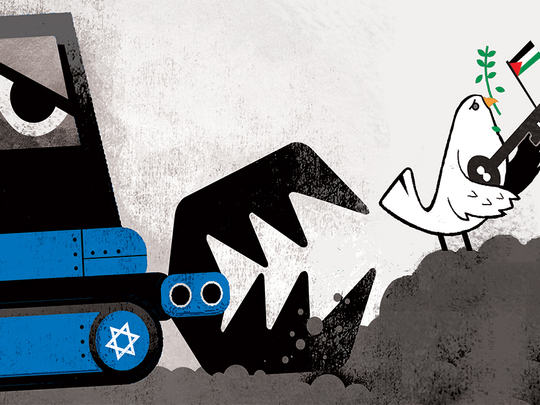
Friday was the 67th anniversary of the Nakba — ‘the catastrophe’ when Palestinian villagers were forced from their homes to make way for the Israelis. Every other year the event has warranted at least a few column inches in the western press. This year it has been widely ignored.
More surprising still, the Arab press has scarcely nodded at the one thing that used to unite us all in protest and rage.
Until very recently, the Palestinian cause was the prism through which the region’s political thought was sharpened — whether it be Arab nationalism or Salafi-extremist ideology. But that passion for justice for the Palestinians has been usurped — first by the aspirations of the Arab Spring and latterly by its failures. It was noticeable during the mass televised demonstrations in Tunisia, Egypt, Libya, Yemen and Syria that hardly anyone was carrying the Palestinian flag which had, for so long, been the symbol of righteous struggle.
As well as seeking liberation from tyranny, the Arab revolutions brought wider, less local, political issues to the front line — concepts such as democracy, the necessity for an independent judiciary, and human rights
Failure to achieve these things came as a bitter blow to the Arab street and all that anger and frustration was somehow diverted into a violent sectarianism and regional polarisation that has eclipsed the Arab-Israeli conflict. Indeed, for many Arabs — governments as well as individuals — the regional nemesis is not longer Israel but Iran.
Sectarian civil war is raging in Syria, Iraq and Yemen, and the contagion of Sunni-Shiite hatred has thrown the whole region into chaos and turmoil and preoccupies its consciousness. That the course of history has somehow (temporarily) let Israel off the hook certainly suits America’s regional projects and Washington did little to stop the poison of sectarianism seeping through Iraq after it installed a pro-Iran Shiite-dominated regime that actively discriminated against the country’s Sunni minority. Meanwhile, in Yemen and Syria, the Americans are siding with the so-called ‘Sunni bloc’. Is this mere inconsistency or, as some conspiracy theorists claim, a deliberate ploy to divide and conquer undermine and destabilise the Arab world? It is undeniable that another by-product of the Arab Spring — Daesh (the self-proclaimed Islamic State of Iraq and the Levant) — is actively fomenting sectarian violence. And extremism is the only thing that is thriving in the post-eruption lava fields.
Sectarian civil wars and Daesh have taken centre stage, dominating the media and the foreign policy decisions of regional and western governments.
The last round of Palestinian-Israeli peace talks, energetically championed by US Secretary of State John Kerry, fizzled out after an April 2014 deadline for establishing a broad outline for agreement expired. Nevertheless, in October 2014, Kerry re-affirmed that the White House remained convinced that the key to regional stability and the demise of extremism lay in the peace process. In marked contrast, in an interview with Asharq Al-Awsat last week, Obama claimed that ‘the best way to ensure the security of the region’ is the nuclear deal with Iran he is currently brokering... on Palestine he was evasive and non-committal.
Certainly connected to this volte face is the fact that Israeli Prime Minister, Benjamin Netanyahu was re-elected in March on an explicitly racist, pro-colonist platform that included a categoric promise that ‘there will be no Palestinian State’. This shocking statement — which is a complete departure from the well worn ‘two-state solution’ path — has gone largely unchallenged by the global community.
Nor have the Palestinians helped themselves. Palestinian National Authority (PNA) President, Mahmoud Abbas has taken some bold steps — such as joining the International Criminal Court earlier this year — but his failure to follow through by commencing proceedings against Israeli leaders for war crimes, or, at the very least, terminating the PNA’s security co-operation with Israel, reduces the move to a provocation rather than a serious threat.
Disheartening too are the petty squabbles — often over money — that prevent Hamas and Fatah from uniting in strong government and resistance.
The White House used to link Israel’s oppression of the Palestinians to the lure of extremist groups, and the leaders of Al Qaida made a point of linking their militancy to the liberation of Palestine. Interestingly, in his first major sermon as ‘Caliph’, Daesh leader Abu Bakr Al Baghdadi placed the occupation of Palestine only seventh on a list of grievances that merited ‘vengeance’ — after the plight of Muslims in Myanmar, Kashmir, the Philippines, Bosnia and the Caucasus.
Last summer, Gaza demonstrated its resilience during Israel’s seven week bombardment which killed over 2,200 innocent Palestinians, many of them children. The brutality of ‘Operation Protective Edge’ and the heroic resistance of Palestine’s freedom fighters reminded the world of our cause and galvanised the burgeoning Boycott Divestment and Sanctions movement.
Although it is obscured for now by other conflicts and regional turmoil, the Palestinian cause will not simply disappear under the rubble of Gazan homes demolished by Israeli bulldozers.
History shows us that while major regional events such as the Iran-Iraq war or the Gulf war may periodically eclipse it, the Palestine-Israel conflict remains the single most destabilising issue in the Middle East.
There can be no peace without justice for the Palestinians. Surely that should be obvious after 67 years?
Abdel Bari Atwan is the editor-in-chief of digital newspaper Rai alYoum: http://www.raialyoum.com. You can follow him on Twitter at www.twitter.com/@abdelbariatwan








